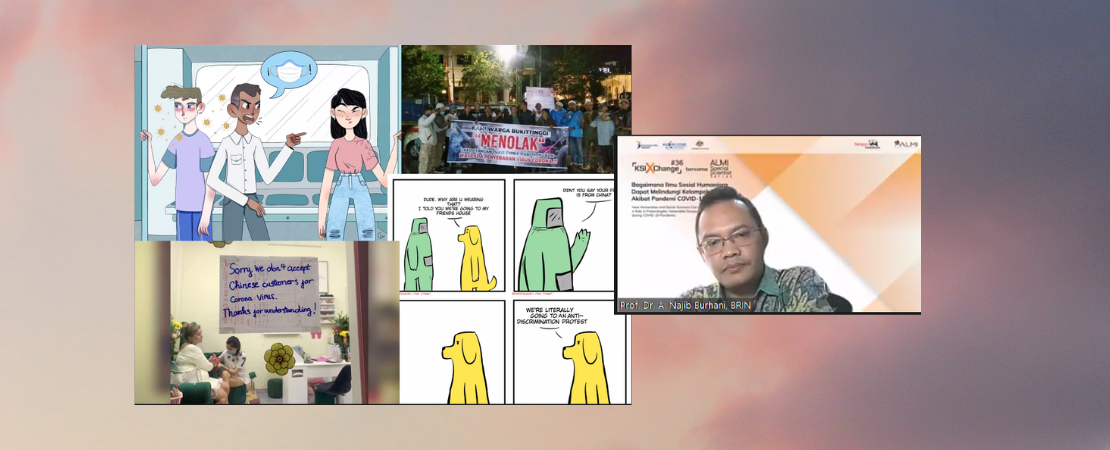While religion can maintain social cohesion during the uncertain situation caused by the pandemic, religious conservatism often collides with the scientific approach needed to manage the pandemic. Multi-perspective studies are needed to untangle this.
These ideas were presented by A Najib Burhani, a social, cultural and religious researcher at the Social and Humanities Science Research Organization of the National Research and Innovation Agency (BRIN), at the KSIxChange#36 event: ALMI Special Scientist Series, on Tuesday 21 September. The forum, ‘How Social and Humanities Science Can Protect Vulnerable Groups from the Impact of the COVID-19 Pandemic’ was held by the Knowledge Sector Initiative (KSI), in collaboration with the Indonesian Young Academy of Science (ALMI).
Speakers at the forum presented the situation of vulnerable groups in Indonesia. In addition to Najib, other speakers included an education researcher from the State University of Semarang (Universitas Negeri Semarang), Zulfa Sakhiyya, an art and culture researcher from the State University of Jakarta (Universitas Negeri Jakarta), Aprina Murwanti, the Executive Director of Sajogyo Institute, Maksum Syam, an economic researcher from the University of Indonesia, Teguh Dartanto, and a health researcher from Hasanuddin University (Universitas Hasanuddin), Sudirman Nasir. Inaya Rakhmani and Evi Eliyanah from ALMI moderated the discussion. The event was broadcast on The Conversation Indonesia’s YouTube channel and was equipped with English and Bahasa Indonesia interpreters, as well as sign language interpreters.
Najib’s presentation looked at the position of religion and science during the pandemic. In some situations, religious practices are thought to have contributed to the spread of the virus. For example, a religious event in Gowa, South Sulawesi, is said to have contributed 1,068 COVID positive cases in Indonesia. In India, as many as 29.8 percent of the 14,378 COVID-19 positive cases in April 2021 were people who went to religious ceremonies. These events are alleged to be the cause of the second COVID-19 wave in India.
According to Najib, theological perspectives are often behind attitudes that appear to be anti-science. This is evidenced, for example, by religious groups arguing that they are more afraid of God than a virus.
Minorities continue to be discriminated
During the pandemic, pressure and discrimination against minority groups has still occurred. Najib recorded three violent incidents toward minority groups between March and June 2020: the pressure from Aliansi Benteng Aqidah on the District Head of Bogor to restrict Ahmadiyah; the sealing of an Ahmadiyah mosque in Singaparna, West Java; and the sealing of a family cemetery to restrict people from following the Adat Kruhun Urang (AKUR) Sunda Wiwitan religion, in Kuningan, West Java.
“These acts show that, at least for certain community groups, the pandemic is not the main issue,” Najib said. “Sectarianism plays a role in the groups’ beliefs,” Najib added.
Najib said discrimination during the pandemic was not limited to certain religious or faith-based groups, but also targeted ethnic groups. He said that, as the pandemic started in Wuhan, China, for example, Chinese ethnic groups were considered to be the spreaders of the virus.
Discrimination suffered by minority groups before the pandemic has continued during the pandemic, making these groups more vulnerable to suffering social and economic pressure. This type of discrimination also affects how these groups receive services and rights during the pandemic.
Najib said that despite this, minority groups had responded positively during the pandemic. “They actually became groups that were quite cooperative and contributed to widescale COVID-19 prevention, despite being discriminated so much,” he said.
A multi-perspective approach
During this complex situation, Najib believes that social humanities science has played a strategic role in studying these frictions. “We actually have the capital, such as how Indonesia has the spirit of philanthropy, volunteerism, and working together, more than any other country,” he said. “This is part of the strength we can develop.”
Najib emphasised the need for a social-cultural character review when formulating pandemic eradication programs, as people’s attitudes in responding to situations are affected by social-cultural characters, including religious values. “For example, the case when a funeral according to protocols was rejected, or how the vaccination program was hindered when many people considered the vaccine as a product engineered in such a way to control humans,” he explained.
Using a social humanities approach, Najib believes we can see how the pandemic can redefine society’s view on familial relationships, including with deceased family members. This occurs when visits to cemeteries, which are usually done just before the Eid Al Fitr day, must be postponed due to social restrictions. “There are innovations to adapt to that tradition,” he said.
Najib concluded that, in managing the pandemic’s impacts, relevant parties must accommodate the sensitivities of different cultures and religions when communicating issues considered sacred to the community. “Don’t look at religion as a hindrance. Instead view it as capital that can help. Ritual recommendations and modification efforts should become tools to maintain social relationships and the stability of familial relationships, including in minority groups. The pandemic becomes an opportunity to strengthen our relationship with them and sustain our humanity” he emphasized.






